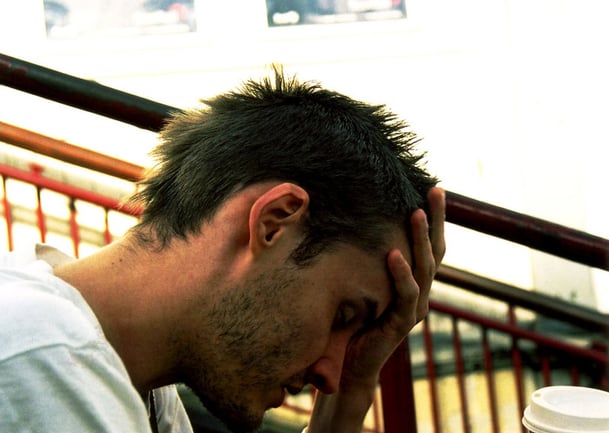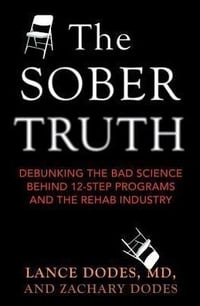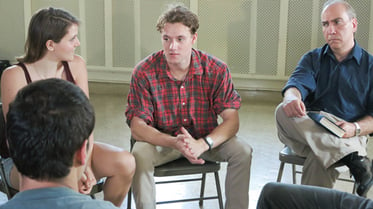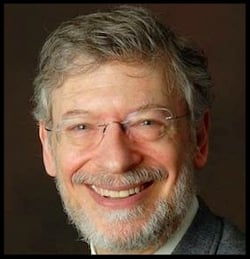
12 Step programs have been the standard of care in both outpatient and residential addiction treatment for the better part of the last century.
But if these programs work so well, then why do we see so many people struggling to stay sober after rehab? Why do we see dismal relapse rates?
It’s clear that modern addiction treatment needs an overhaul. In this time of crisis, when so many people need support to recover, it’s important to connect with reliable sources and learn from the professionals at the forefront of addiction medicine.

That’s why we connected with Dr. Lance Dodes - Harvard Medical School professor, renowned analyst, author, professor, and thought leader - to discuss the past, present, and future of addiction treatment.
Today we're talking specifically about his latest book, The Sober Truth: Debunking the Bad Science Behind 12 Step Programs in the Rehab Industry.
Video Interview with Dr. Lance Dodes, on Debunking the Bad Science Behind 12 Step Programs
Lance Dodes Audio Interview: The Sober Truth
Edited Interview Transcript with Lance Dodes
Caroline McGraw: Let's start with the surprising statistic that you share in The Sober Truth which is that AA, the quintessential 12 Step Program, has only about a 5 to 10% success rate. And obviously that's a big problem, considering that about three-quarters of the residential addiction treatment centers in the US are 12 Step-based. I guess my first question is how did we get here?
How 12 Step Programs Were Popularized
Dr. Lance Dodes: Well, when AA started in the 1930s, when Bill Wilson wrote Alcoholics Anonymous, it was actually widely panned by the American Medical Association and everybody else. But what happened over the years was there was a remarkable shift between roughly 1935 and 1945.
Bill Wilson encouraged people to join his program, and most importantly, he encouraged those people to talk about their successes. When people didn't do well, they disappeared, which is still true today. We don't hear about those people.
When people didn't do well, they disappeared, which is still true today. We don't hear about those people.
 But eventually he got the ear of one of the major writers in the country, a columnist, Jack Anderson, who wrote for the Saturday Evening Post.
But eventually he got the ear of one of the major writers in the country, a columnist, Jack Anderson, who wrote for the Saturday Evening Post.
And he wrote what became a famous article extolling the virtues of AA and saying, “It's marvelous. It's a miracle.” And he justified that by talking about several people, individual cases, where people had transformed their lives.
Almost overnight, everybody bought into this. And you have to understand
..first of all, there was never any scientific evidence for it then or now, which I'll come to …But people were desperate.
People were desperate to find something, and they latched onto [AA] the way people do with a lot of ideas which turn out to be not actually useful, but they're exciting.
By the mid-1940s, the AMA had reversed its position and [the 12 Steps] became the standard in this country. Many people came to believe that AA was the treatment or the best treatment for alcoholism without any evidence, and that's been true ever since.
Caroline McGraw: Wow! That's amazing. As an non 12 Step rehab - we get a good bit of pushback from those people for whom the 12 Steps really has worked, and to that, we usually say, “Great. That's wonderful. We're happy it worked for you.”
But as you said, there's a large amount of people for whom that's not the case. I guess maybe first we should talk about the science and dive into more what your book talks about ... stepping away from the personal testimony standpoint and talking more about the research.
12 Step Programs: Evaluating the Evidence
Dr. Lance Dodes: Yeah. Well, there have been studies. AA does some of its own studies which are mostly secret, although one of them was published in the 1990s, in which they confirmed what other studies have shown, which is that a very tiny percentage of people actually join, stay in the program, and get sober.
In 2006, The Cochrane Collaboration, which is a worldwide group of scientists whose task it is to vet science - they're extremely highly regarded. And they did this with research on AA and reviewed the last 50 years of studies.
What they do [at The Cochrane Collaboration], which other people don't, is they look for studies that are well done. That's what I say; that's science. And they found a handful of studies that they felt were actually meaningful. That is, they met the criteria for being a good study. And their result was astonishing.
[The Cochrane Collaboration] said that we can't find any evidence of any effect of AA on the basis of the studies that are worth looking at.
It's a remarkable finding. They also found the same lack of evidence for TSF which stands for "12 Step Facilitation." The 12 Step Facilitation is the so-called treatment or therapy that almost all the 12 Step rehabs use, and many outside clinics and therapists use.
TSF is not really a therapy at all. It is, as its name implies, a way to get into the 12 Steps. But it has the same absence of success as AA.
Now when we studied it in The Sober Truth …. we looked at all those studies and we also tried updating newer studies, and what we found was that if you accumulate all the data the success rate [of 12 Step programs] is between 5 and 8%, something like that.
"The success rate of 12 Step Programs is between 5-8%."
Another Look at the 12 Steps EBook Download
Sampling Bias in Studies of 12 Step Programs
We were very unhappy to find that the studies that purported to show effectiveness were so severely damaged, so poorly done, that you had to reinterpret their findings.
Just to give you a single example, one of the reasons AA has done so well is because of a sampling bias.
That is, we hear from the people who do well.
We don't hear from the people who don't do well.
So it contributes to the public perception that everybody's doing well, when actually practically nobody is.
Geek Alert - Sampling Bias
[In statistics, sampling bias is a bias in which a sample is collected in such a way that some members of the intended population are less likely to be included than others. In other words, it is not a true representation of the entire population.]
Well, the same problem occurred with the scientific studies.
There were enormous numbers of dropouts from these studies. These are longitudinal studies [meaning they tracked the same people over long periods of time]. There was an enormous percentage of dropouts.
Even the authors acknowledged the people who dropped out were the people who weren't doing well. But they disappeared from the study. They didn't participate in the final numbers.
In one of the most studied results, which went over the longest time, they concluded that AA was effective on the basis of about 14 or 15% of all the people who had been in the study. That's all that was left.
Basically they said was,
“If you eliminate everybody who's not doing well and you look at the people who have done well, it works.”
It's illogical. That was basically what we found.
Pushback on Non 12 Step Rehab
I just want to say one other thing. It's a piggyback on what you said .… You said you get pushback [as a Non 12 Steps rehab program].
The pushback is almost always, “Well, it helped me or it helped my brother or it helps people. Why do you complain?”
And the answer is, as you said, it's great for the people who do well.
 But if we're prescribing AA for 100% of the people - or almost 100% - and 90% of the time it's the wrong thing to do, then we are sending them to the wrong place.
But if we're prescribing AA for 100% of the people - or almost 100% - and 90% of the time it's the wrong thing to do, then we are sending them to the wrong place.
Not only that, it's extremely harmful to send them to the wrong place.
And anybody who's been in this field for any time knows of people who have spent decades literally, going back and back to AA because they believe that it should work.
And they wasted their lives doing it.
Second of all, AA itself never takes responsibility for its failures.
In medicine or psychology, if the treatment doesn't work, you change the treatment.
You don't say [to the patient] "you're the problem, you have failed."
"I'm giving you an antibiotic. Why aren't you getting better from this infection?"
But that's exactly what AA says.
AA says, “If you don't do well, work the program harder. Do 90 meetings in 90 days.” They never refer out.
I've never heard of a single case, nor is it in their philosophy to say, “AA is not for you. Go do something better.”
They don't say that, which every professional does say.
The harm it has caused is enormous and never been measured ... except anecdotally.
If you look on the Internet, you will find an enormous number of people talking about their horrible experiences and how their lives have been spoiled by AA, and how they feel more ashamed of themselves because their fault. They're not working the program hard enough [supposedly].
The True Definition of Addiction
Caroline McGraw: What are the detriments to potentially doing the program?
You have this wonderful description of the nature of addiction, and I just wanted to share it with folks. I thought it was so illuminating.
"Addictive acts serve as a way to restore a sense of power when a person feels helpless. The drinking, gambling, cleaning, eating expresses the great anger people feel of being made powerless, and at the same time, the act itself restores a sense that they can control their own feelings through their own actions."
And I just thought that was fascinating because if addiction is about helplessness, then treatment and recovery should be about power and overcoming that helplessness, and what you're describing is a lot of times the detriment with AA is that it digs people deeper into that helplessness and that hopelessness, as opposed to empowering them.
Dr. Lance Dodes: Well, [AA] begins, as you know, by saying, “We admitted we were powerless over alcohol.” Yeah, actually we're talking about The Sober Truth today, which I'm glad of, but my first two books, The Heart of Addiction and Breaking Addiction, were all about this concept.
I got into the field because I'm a psychoanalyst and I was interested in understanding the psychology behind addictive behavior, and yes, I've written a couple of books about how people can manage their own addiction by understanding exactly what you've described.
[We also have a definition of addiction - very similar to Dr. Dodes.]
When Should You Try 12 Step Programs?
 Yes, there are better ways, and there are other ways, too, by the way.
Yes, there are better ways, and there are other ways, too, by the way.
AA ought to be prescribed ... if you have a neutral therapist, if you go to see someone, they should say, “Let's see if you are in that 5% that can be helped [by AA].”
Because we all agree that that 5% should go, if you are in that 5%.
There should be some sort of triage process, first of all.
Second of all, it is possible to do more than one thing at once.
My very first paper that I published was about combining AA with psychodynamic psychotherapy, which went well.
If You're In the 90%, Get Out
The third thing is, if you go to AA and it's not helping you, if you're in the 90%, get out.
They won't help you to get out.
They'll say get in more.
But you should know that.
Caroline McGraw: That's perfect. That's a great takeaway.
I also just wanted to touch on something you said there with going into working with therapy and working with those mental and emotional health issues that really drive addiction. I wanted to ask how you would describe that interrelationship between mental health concerns, depression, anxiety, and addiction.
The Importance of Holistic Addiction Treatment
Dr. Lance Dodes: Well, one of the important things when I teach about this is to say ... it's a bad idea to separate out addiction treatment from treatment of the whole person, for two related reasons.
One is, addiction is a symptom.
It's a symptom. That's what I describe. It's a symptom of something and you don't have to necessarily resolve all the issues to fix the addiction part, because you won't need to understand how it works in you, but if you leave out the addiction, you lose an opportunity to understand the person.
If you only look at the addiction and you don't pay attention to the person's emotional life, then you'll never understand why the person has the addiction to begin with.
So they go hand-in-hand.
Addiction is Just a Symptom
One of the things I also always point out is that addictive urges are not random.
When people feel the urge, they often don't know why.
But there is a reason, and it's always the same reason for them. It's something about that makes them feel overwhelmingly powerless or helpless, and it's different for different people. So they have to learn themselves.
Start looking when people have the urge. If you start looking backwards and you say, “What just happened?” I try to encourage it. Breaking Addiction, my second book, talks all about this.
You look backwards and you can eventually figure out that there's something the same about all these incidences.
They look different on the surface, but once you've discovered that, you will also have discovered the main thing that's bothering you in general in your life.
[Addiction] is just a symptom.
And the other thing, just in terms of mental health in general, there actually is no correlation between addiction and mental health in general, if you mean people who are quite ill and people who are quite healthy.
Everybody can have an addiction. It's wrong to say people with addictions are somehow sicker than other people. They're not.
The Logic of Addiction
 Caroline McGraw: And something I loved about your book is how you really illustrate those moments where it's actually very logical that a person would take a step toward an addiction. We call that finding "the positive aspect of addiction."
Caroline McGraw: And something I loved about your book is how you really illustrate those moments where it's actually very logical that a person would take a step toward an addiction. We call that finding "the positive aspect of addiction."
You frame it as, “This is a moment where they feel powerless, and they want to do something.” They don't want to be totally passive, so they reach for the addictive substance or behavior, and it's actually completely logical.
People might think, “Oh, this is pathological.”
But if you think about what's really going on here, it makes sense if you can zoom out a little bit.
Dr. Lance Dodes: Yes, and I think that addiction makes sense.
And one of the reasons why people turn to these strange ways of trying to treat addiction is that they think it makes no sense. They say, “Maybe taking a moral inventory of myself will help.” But it has nothing to do with addiction.
You Are Not Powerless Over Addiction
Caroline McGraw: Oh, that is powerful. Well, I want to honor your time. I know you have another patient to see after this, so I just wanted to ask if there's anything you would like to say in closing, any final words of encouragement for folks who are dealing with addiction who are listening.
Dr. Lance Dodes: What I'd like to do is simply encourage them.
I would say that it is not an overwhelming problem that you can't deal with. You are not powerless over it.
You just have to learn how it works in you and really anyone can do that. If you're in AA and doing well, great. Continue.
If you're in AA and not doing well, then I'd get out as quickly as possible, because they are not going to help you to get out.
And either find a good therapist or you can think about the kind of things that I wrote about in my books and what we've talked about today. There are better ways out, and it's not hopeless at all.
Another Look at the 12 Steps EBook Download
About Dr. Lance Dodes
 Lance Dodes, M.D. is a Training and Supervising Analyst Emeritus with the Boston Psychoanalytic Society and Institute and was assistant clinical professor of psychiatry at Harvard Medical School (retired).
Lance Dodes, M.D. is a Training and Supervising Analyst Emeritus with the Boston Psychoanalytic Society and Institute and was assistant clinical professor of psychiatry at Harvard Medical School (retired).
He has been the Director of the Substance Abuse Treatment unit of Harvard’s McLean Hospital, Director of the Alcoholism Treatment Unit at Spaulding Rehabilitation Hospital (now part of Massachusetts General Hospital) and Director of the Boston Center for Problem Gambling.
He is the author or co-author of a number of journal articles and book chapters about addiction, including The Heart of Addiction, Breaking Addiction, and The Sober Truth.



